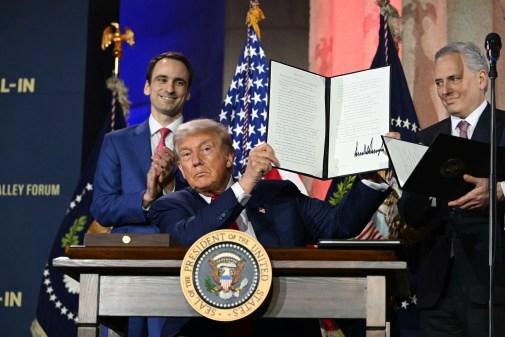AI’s future depends on who’s at the table — not just who’s in the Oval Office

Some of Silicon Valley’s most prominent voices and influential players are working overtime to influence the election. To hear them tell it, the future of American innovation — including our leadership on AI — will be decided on Nov. 5.
But the truth is, regardless of who wins the presidency, the essential questions for AI regulation will remain the same: Who will write the policies that propel AI forward? Who will set the guardrails in the public interest and provide the clarity that all markets need to thrive?
Right now, Big Tech is the only voice in the room. In 2022, the top five technology companies with the largest lobbying presence spent a combined $76 million on lobbying efforts alone, according to a Responsible Innovation Labs analysis of OpenSecrets data. RIL also found that over the past five years, these companies spent an average of $69 million and employed an average of 92 lobbyists. From 2022 to 2023, AI lobbying increased by 185%.
At the other end of the spectrum are America’s startup founders, who you’ll have to forgive if they’re not hyper focused on politics. They are working right now to build the next great American companies powering — and powered by — AI. They are grinding tirelessly to win. They are creating AI applications to tackle health, disaster preparedness, agriculture, and critical infrastructure, among other areas of American economic strength. In other domains, they are exploring space and working toward energy security.
For AI regulation — and tech policy — to work, American startup founders need to be at the table.
Lawmakers don’t have to go far to engage early-stage tech startups. Many are cropping up far from Silicon Valley, in places like Pittsburgh, Austin, Raleigh, and Salt Lake City. The right policy approach will help these startups scale, win responsibly, and drive economic growth in a much more diverse set of states and districts.
We won’t beat China at AI if startups are excluded from policy making and only a small slice of Big Tech companies dominate. Big Tech companies push for regulation they can live with and afford. They can deal with regulatory uncertainty and legal ambiguity. Startups cannot. Big Tech lobbying and the push to legislate AI is more likely to hurt startup competitiveness and the opportunity to raise the bar for how tech companies scale.
There are examples aplenty of Big Tech’s dominance in AI discourse. Some are inviting regulation, others are suggesting licensing regimes, and others have even proposed stopping everything. The Senate’s AI Insight Forum series was a good example of listening and learning. But more than 80% of the corporate voices heard represented Big Tech and large enterprises. Even advisory committees are susceptible to capture. The AI Safety and Security Board for the Department of Homeland Security, tasked with advising on the “safe and secure development” of AI in critical infrastructure, lacks a single startup voice among the board’s 22 members.
The onus is not solely on lawmakers to integrate early-stage companies. Startups need to be willing to take time to tell their stories and engage with policy makers. I have the great privilege to meet founders across the country who want to improve life in our country and around the world. We’ll be better off when startups and policy makers can sit on the same side of the table looking at the benefits, risks, and externalities looming on the horizon.
There’s another reason to help startups. The age of AI demands that responsible innovation become table stakes when building great companies. Policy makers should promote responsible innovation among startups — not just through rules, but through market mechanisms, standards, and transparency. We cannot afford AI being dominated by the same Big Tech players that have flouted notions of responsibility in recent decades.
Past irresponsibility threatens the permissionless innovation startups need to thrive. When technology as powerful as AI arrives, it’s incumbent on policy makers and startups to dialogue on looming societal impacts, risks, and externalities. Startups do need space to chase emergent opportunities and respond to market demands. But permissionless does not mean reflexively anti-guardrail. Founders I speak with all want clarity and a level playing field to out-compete their rivals. We should strive to give builders the space they need while making responsible innovation in tech the modern equivalent of the quality in manufacturing movement.
AI must strengthen our ability to live, work, care for our families, and contribute to our communities. It must keep our infrastructure and environment secure, clean, and resilient. AI can support these aspirations if we invite early-stage innovators into the policy conversation.
About a decade ago, The Economist likened the proliferation of startups to a modern Cambrian explosion — a period when the potential of software-driven innovation felt limitless. The AI era presents a similar moment — though fraught with more concerns from everyday Americans. If we invite startups to the conversation we can collectively chart the policy course governing this step change in technology. The stakes are too high to ignore the innovation engine essential to our shared success.
Gaurab Bansal is executive director of Responsible Innovation Labs, a nonprofit coalition of founders and investors that provides tailored, actionable, practical guidance for startups to innovate responsibly.






